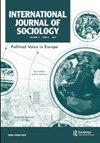Translate Wisely! An Evaluation of Close and Adaptive Translation Procedures in an Experiment Involving Questionnaire Translation
IF 1.1
Q2 SOCIOLOGY
引用次数: 2
Abstract
Abstract To challenge the commonly made assumption in cross-national survey projects that close translation yields more comparable data than adaptation, we implemented a translation experiment in the CROss-National Online Survey Panel. The English source questionnaire was split into three batches of 20 items each and was translated by three translation teams into Estonian and three teams into Slovene. The teams received specific instructions on how to translate each batch (either closely or adaptively) so that, by design, the teams translated two batches following one approach and one following the other approach. Respondents in the two countries (Estonia and Slovenia) were randomly assigned to three distinct questionnaire versions based on the same source questionnaire, each consisting of translations by all three teams and including close and adaptive translations. We developed an analytical framework to assess the translation potential of the source items (i.e., all theoretically possible translations of a specific item) and the actual translation scores (i.e., the degree of closeness vs. adaptiveness of a specific translation). We show that some items are more sensitive to the wording (small linguistic changes result in a different response behavior) while others are more robust (the meaning of the concept is retained despite linguistic changes).翻译明智!问卷翻译实验中密切翻译程序和自适应翻译程序的评价
摘要:为了挑战跨国调查项目中普遍存在的假设,即密切翻译比适应产生更多的可比性数据,我们在跨国在线调查小组中实施了一项翻译实验。英文源问卷被分成三批,每批20个项目,由三个翻译小组翻译成爱沙尼亚语,三个翻译小组翻译成斯洛文尼亚语。团队收到了关于如何翻译每批(紧密或自适应)的具体指示,因此,按照设计,团队按照一种方法翻译两个批次,另一个按照另一种方法翻译。两个国家(爱沙尼亚和斯洛文尼亚)的答复者被随机分配到基于同一来源问卷的三个不同的问卷版本,每个版本由所有三个团队的翻译组成,包括密切和适应性翻译。我们开发了一个分析框架来评估源条目的翻译潜力(即,特定条目的所有理论上可能的翻译)和实际翻译分数(即,特定翻译的亲密程度与适应性)。我们表明,一些项目对措辞更敏感(小的语言变化导致不同的反应行为),而另一些项目则更稳健(尽管语言变化,概念的含义仍被保留)。
本文章由计算机程序翻译,如有差异,请以英文原文为准。
求助全文
约1分钟内获得全文
求助全文

 求助内容:
求助内容: 应助结果提醒方式:
应助结果提醒方式:


